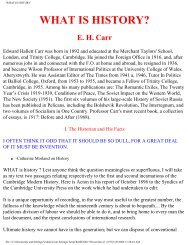The bronze age and the Celtic world - Universal History Library
The bronze age and the Celtic world - Universal History Library
The bronze age and the Celtic world - Universal History Library
Create successful ePaper yourself
Turn your PDF publications into a flip-book with our unique Google optimized e-Paper software.
i62 THE BRONZE AGE AND THE CELTIC WORLD<br />
Rostovtzeff has suggested that <strong>the</strong>se Koban Wiros were <strong>the</strong> Cimmerians/* <strong>and</strong><br />
since, as we have seen, <strong>the</strong>se P speaking people appear a few years later in Gaul, <strong>and</strong><br />
again are found approaching, if <strong>the</strong>y do not actually reach, <strong>the</strong> peninsula of Jutl<strong>and</strong>,<br />
it seems reasonable to believe that <strong>the</strong> statement of Posidonius,'' which has received<br />
Ridgeway's approval,'* is correct, <strong>and</strong> that <strong>the</strong> Cimmerians of Russia <strong>and</strong> of <strong>the</strong> west,''<br />
as well as <strong>the</strong> people who gave <strong>the</strong>ir name to <strong>the</strong> Cimbric Chersonese are aU one P<br />
speaking people, <strong>and</strong> that we must include in <strong>the</strong>ir number <strong>the</strong> Brythonic Cymry of Britain,<br />
in spite of what Rhys has written to <strong>the</strong> contrary.*" Whe<strong>the</strong>r <strong>the</strong> name was originally<br />
com-brox, compatriots, or not, I must leave to philologists to determine, but if Rhys'<br />
etymology is correct, <strong>the</strong>se compatriots were those who set out from <strong>the</strong> Koban to<br />
conquer <strong>the</strong> greater part of Europe. If this be so <strong>the</strong> statement quoted by Phny from<br />
Lycophron that <strong>the</strong> Cimmerii were a people hving around Lake Avernus*' may not be a<br />
poetic fable, as has been supposed, but may show us that some of <strong>the</strong> Villa-nova<br />
invaders of Italy retained for a time <strong>the</strong> common name which survives in Wales to-day.<br />
Thus I am assuming that <strong>the</strong> words Kinixkpioi, Kififiepoi, Cimbri Cymry are all one, <strong>and</strong><br />
suggest <strong>the</strong> use of <strong>the</strong> term Kimri" for <strong>the</strong> whole group.<br />
Herodotus tells us that <strong>the</strong> Russian Cimmerians built castles or forts,*^ a custom<br />
which is found among <strong>the</strong> early iron <strong>age</strong> or Hallstatt inhabitants of <strong>the</strong> mountain<br />
zone,*'* <strong>and</strong> reached this country somewhat later in <strong>the</strong> form of HUl-top camps. <strong>The</strong>ir<br />
distribution has not yet been weU worked out, but <strong>the</strong>ir date is Hallstatt or sometimes<br />
later, <strong>and</strong> <strong>the</strong> available evidence from <strong>the</strong>ir distribution in time <strong>and</strong> space suggests<br />
that <strong>the</strong>y were <strong>the</strong> work of different branches of <strong>the</strong> Kimri.<br />
A large number of <strong>the</strong> Kimri, perhaps <strong>the</strong> greater part, remained in <strong>the</strong> Koban<br />
region until <strong>the</strong> seventh century, when <strong>the</strong>y were displaced by incoming Scythian hordes,<br />
i^ Rostovtzeff (1920) III.<br />
17 Diodorus Siculus v. 32 ; Niebuhr (1838) ii. 523.<br />
18 Ridgeway (1901) 369, 370.<br />
19 Horn. Od. ii. 14.<br />
»" Rhys (1884) 279.<br />
21 Pliny, Hist. Nat. III. ix.<br />
" Holmes (1907) 438, says <strong>the</strong> term was used by Broca (1871) i. 395.<br />
»3 Herodotus iv. 12.<br />
M D6chelette (1908-14) ii. 593.







